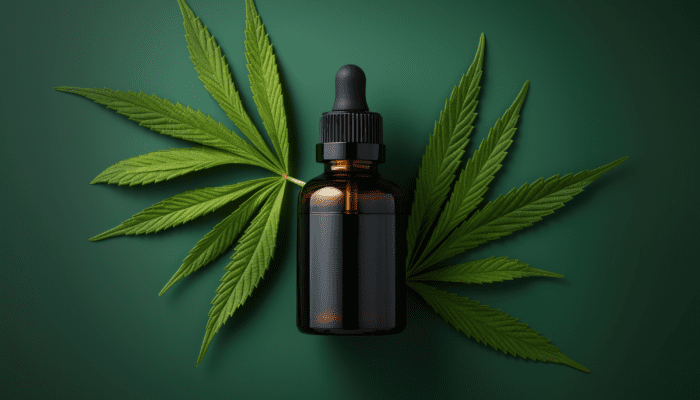CBD has recently exploded onto the health scene, with many health claims in tow. But what can cannabinoids really do for inflammation?
Inflammation is a natural body process, but when it occurs unchecked and in the wrong place it can result in pain and several potential conditions.
Research tells us that there’s a lot to be excited about when it comes to CBD’s impact on inflammation.
What Is CBD?

CBD is one of the major cannabinoids found in hemp and can also be purchased in a range of isolated forms. CBD oil is one of the most popular CBD products, but you can also find it in everything from shampoos, edibles, and vapes. While CBD is a main active compound in hemp, it can’t get you high the psychoactive effects of THC (tetrahydrocannabinol), another type of cannabinoid most associated with cannabis.
Interestingly, CBD exerts its effects on the body in a slightly different way to other cannabinoids. This is because CBD can only weakly bind to cannabinoid receptors like CB1 or CB2. Instead of binding to cannabinoid receptors, CBD acts on non-cannabinoid receptors and other receptor pathways to induce its effects.
With the legalization of hemp in the 2018 Farm Bill, CBD has seen increased recognition, sales, and research. This is due in large part to its broad potential health benefits.
Both anecdotal and scientific research tells us that CBD holds significant therapeutic potential and may be effective in treating a range of conditions and symptoms. Studies have shown that CBD may be able to reduce depression, anxiety, pain, seizures, and symptoms of sleep and skin disorders (1, 2, 3, 4, 5). One of CBD’s most significant health benefits seems to be its ability to reduce inflammation.
When Inflammation Goes Wrong
Inflammation is a natural body process that is important to maintaining your health. It is one of the main tools your body has for fighting off infections and recovering from injury.
However, when inflammation goes wrong it can result in symptoms like pain, swelling, and heat. Inflammation is a key symptom of many conditions and chronic inflammation can also increase your risk of weight gain and affect your overall quality of life.
Inflammatory conditions are often treated with nonsteroidal anti-inflammatory drugs (NSAIDs) and steroid medications. While these are often effective, they can also come with serious side effects. Long term use of NSAIDs, for example, can increase your risk of heart failure, while long term use of steroid medication can increase your blood pressure and risk of osteoporosis (6, 7, 8).
CBD’s potential to act as an anti-inflammatory and treat inflammatory conditions could offer another treatment option for patients struggling with the side effects of conventionally prescribed inflammatory medications. Although it is important to note that research into CBD as an anti-inflammatory is still in the early stages.
CBD’s potential to act as an anti-inflammatory and treat inflammatory conditions could offer another treatment option for patients struggling with the side effects of conventionally prescribed inflammatory medications. Although it is important to note that research into CBD as an anti-inflammatory is still in the early stages.
Current Research about CBD and Inflammation
Current research about CBD tells us that CBD’s anti-inflammatory effects likely occur through its activation of glycine receptors. Glycine receptors, specifically GlyR, can induce the suppression of inflammation and CBD may be able to cause an anti-inflammatory effect through enhancing the expression of GlyR (9).
CBD’s anti-inflammatory effects occur not just through the enhancement of anti-inflammatory receptors, but by suppressing pro-inflammatory factors. CBD has been found to suppress the production of pro-inflammatory cytokines like tumor necrosis factor, chemokines, and IL-1β. As well as suppressing production, CBD has also shown an ability to reduce the activation and migration of specific immune cells (10).
If CBD’s anti-inflammatory effects have convinced you to add the cannabinoid to your routine, be sure to look for a quality product. We particularly like Silver Lion Farms for their high-strength CBD, transparent practices, and the fact that they combine CBD with CBG, another cannabinoid which has demonstrated anti-inflammatory abilities (11).
Inflammatory Conditions That May Be Improved By CBD’s Anti-Inflammatory Effects
The anti-inflammatory abilities of CBD hold a lot of potential for a range of inflammatory diseases. Inflammatory diseases that have shown symptom improvement from CBD treatment include:
Irritable Bowel Syndrome
Inflammation can be especially debilitating when it occurs in the gut, resulting in painful conditions like Irritable Bowel Syndrome (IBS).
CBD holds potential as a treatment for inflammatory conditions in the gut. A 2019 study found that CBD reduced inflammation in the gut by affecting a range of inflammatory factors, which could have significant treatment implications for patients with Irritable Bowel Syndrome (12).
Acne
CBD’s anti-inflammatory activity has shown promise in the treatment of acne. A number of factors can contribute to the development of acne, including inflammation.
A 2014 study found that CBD exerted an anti-inflammatory effect on human skin culture, suppressing the proliferation of cytokines. The study concluded that the anti-inflammatory effect of CBD on skin cells shows that CBD is a promising treatment for acne (13).
Neurodegenerative Diseases
One especially exciting potential application of anti-inflammatory CBD is in the fight against neurodegenerative diseases. Conditions like Alzheimer’s disease, Parkinson’s disease, and multiple sclerosis occur in part due to inflammation in the brain.
CBD has been found to suppress the production of pro-inflammatory factors that play a key role in this neurodegeneration, such as the cytokines tumor necrosis factor and interleukin-1-beta (14).
Diabetes
CBD’s anti-inflammatory effects may also be able to improve the symptoms of diabetes. A 2016 study found that CBD significantly reduced inflammation in the pancreas of mice with type 1 diabetes by reducing leukocyte activation.
This is significant because the breakdown of cells that produce insulin is what leads to type 1 diabetes and pancreatic inflammation is what destroys the cells (17).
The Bottom Line
While inflammation is a normal body process that can help you to fight infection and injury, when it goes wrong it can be painful, debilitating, and dangerous. Current nonsteroidal anti-inflammatory and steroid treatments for inflammation can also come with serious side effects, so the recent insight, so the recent insight into CBD’s naturally occurring anti-inflammatory properties is a welcome development.
CBD has shown a strong ability to reduce inflammation by acting on the proliferation, activation, and migration of inflammatory cells and pro-inflammatory factors.
The strong anti-inflammatory action of CBD means that it shows promise as a treatment for inflammatory conditions, such as IBS, acne, diabetes, and neurodegenerative conditions.




